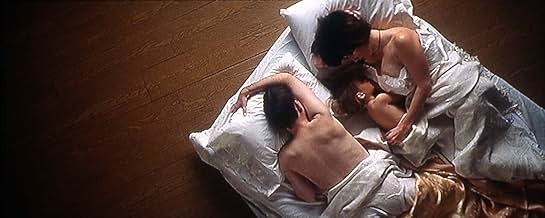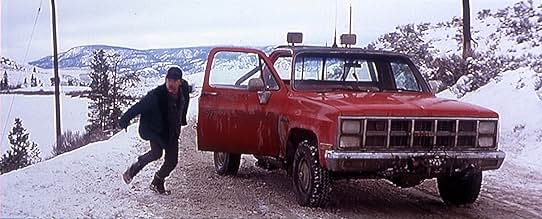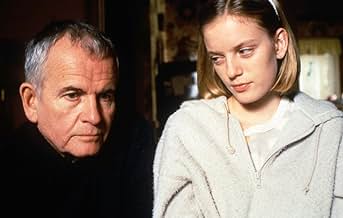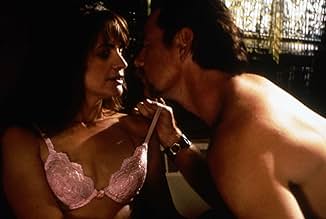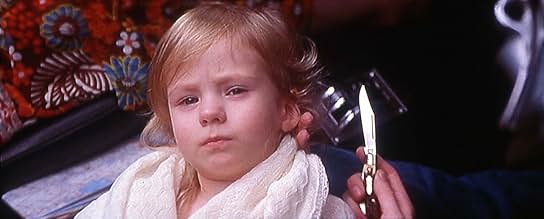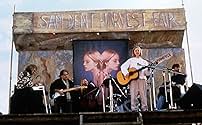Un incidente d'autobus in una piccola città fa arrivare un avvocato per difendere le famiglie, il quale scopre però che non è tutto come sembra.Un incidente d'autobus in una piccola città fa arrivare un avvocato per difendere le famiglie, il quale scopre però che non è tutto come sembra.Un incidente d'autobus in una piccola città fa arrivare un avvocato per difendere le famiglie, il quale scopre però che non è tutto come sembra.
- Candidato a 2 Oscar
- 34 vittorie e 56 candidature totali
Recensioni in evidenza
The grieving parents are visited by a no win no fee lawyer, Mitchell Stevens (Ian Holm.) He is a partner in a law firm and he might be just doing his job but it seems to be without much vigour or conviction. I am not sure whether money is even a motivation for him. Stevens own daughter is a drug addict who only contacts him when she wants money for more drugs. Apart from that she hates him and he knows he has lost her.
He persuades some of the parents to file a class action lawsuit by claiming the design or construction of the bus was faulty.
The grieving parents and some of the survivors all have some secret. Did bus driver Dolores Driscoll (Gabrielle Rose) drive too fast or drive carelessly given the road conditions? Does Nicole Burnell (Sarah Polly) one of the kids paralysed below the waist might want to take revenge on her abusive father?
One of the parent, Billy (Bruce Greenwood) who was following the bus and waving at his children is against the lawsuit and wants the others to drop it.
The film does not start with the crash. It is told in non chronological order and we have several story strands. one of them is the use of 'The Pied Piper of Hamelin' which draws parallels of a town suffering from the loss of its children. Maybe Stevens will lead the townsfolk out of the darkness but he is suffering as well when he recounts his struggle with his drug addict daughter to one of her old friends he meets in a plane journey.
The film is about grief, sadness and the tortuous journey to recovery. Unfortunately the film does not always flow well and although I understand why some people would want to sue for damages, I never really understood why Billy did not want to sue? Nicole is paralysed, money would be useful to her and help her.
The story makes no secret of the fact what terrible tragedy will happen, right from the outset. A lesser filmmaker than Atom Egoyan would've jumped at the chance to shock the audience with the freak accident that robs the town of Sam Dent of nearly all their children, by telling the story in a linear fashion. Not Egoyan. The story is fragmented, thus enhancing the true point: This is not about the overwhelming power of loss, it is about the overwhelming power of survivor's guilt (nicely represented in Browning's poem The Pied Piper Of Hamelin, which is referred to in the movie). It's all about people who grieve not only for the ones they've lost, but also for themselves, how empty their lives have become because of their tragedies. In focussing on that point, the film refrains from manipulative sentiment (which so many others don't), and presents true and unintrusive emotion, that, in the end, despite all the terror, shines a light of hope, for the sweet hereafter is not only the peaceful afterlife, it's also the peaceful future, the continuation of life...
The performances speak for themselves. Ian Holm and Sarah Polley shine in particular, through nicely subdued and subtle acting. Polley also excels as a fantastic singer-songwriter. The songs in the movie were written and performed all by herself.
Egoyan's direction is simply masterful in its beauty, elegance and evocation.
One of the best films of the 1990s.
10 out of 10.
I honestly can't imagine anyone being moved by this film. It is too distant to be involving, too vague to be meaningful, too slow to be engaging and too cold to be emotional. But boy, oh boy, is it funny.
The dialogue is so odd and unnatural that it becomes comical. Note the stagy way in which the detective's daughter talks. `Welcome to hard times, DADDY', `I like it when you don't believe me DADDY.' Come on, playing a drug addict is easy just watch Courtney Love and imitate. Zoe doesn't sound drugged out but she must be because she always calls from a payphone where police sirens blast in the background. And Zoe comes off well in comparison to the unintentionally hilarious stroke victim and the Otto's who put their heads together, dry-eyed and sniffle, expecting us to believe that they are crying over their long lost son named, Bear, of all things.
Bravo to the generic and lifeless Sarah Polley who musters a tiny ounce of oomph to deliver `the big lie' at the end you know, the one she said she would NEVER tell. She even attempts to glare at her father and later; if you look really close, it's the beginnings of a grin.
How ridiculous is the scene where Ian Holm recounts a spider bite story that goes absolutely NOWHERE? Why doesn't he remember Alison's father? Why does he get stuck in a CAR WASH? What is wrong with this guy?
And why is creepy Billy a saint for trying to convince Nicole's father not to sue? This anti-sue-happy town sure is unrealistic. Oh, they're Canadian. Thank explains it. Sure Ian Holm's acting is bad but does he really deserve the town's wrath for trying to gain a buck?
There is a really cheesy time transition scene, which illustrates how confused director Atom Egoyan is. He thinks the audience needs to be hand held in order to comprehend the passing of time and yet he fails to explain anything else in this perplexing tale with similar clarity.
Would people really behave the way these people do and what does it all mean anyway? Detective Stephens says that our children are all lost to us. The Pied Piper story echoes similar sentiments. Some school kids are dead while others grow up to become drug addicts and are as good as gone. One strange girl lives and because she tells a lie she is now, apparently, more pure than anyone else in town and well, that's it.
It is always wise to heed the immortal words of Radiohead don't get sentimental, it always ends up drivel. The Sweet Hereafter doesn't even have enough power to illicit the feelings that sentimentality requires. It is the worst kind of drivel -the kind that attempts to be profound, fails and stumbles into pretension, leaving nothing worthy of redemption in its wake.
The Sweet Hereafter is based on a novel by Russell Banks. This doesn't mean that Egoyan hasn't created a film that looks like his own creation. Very beautifully, even with a sense of poetry, the camera moves in a canadian small-town, a scenery full of snow. The nicely unusual music of Mychael Danna creates the mood when a lawyer played by Ian Holm arrives to the town. A School bus lies under ice, and the lawyer is invited to sue someone for the loss of several children.
A very important slice of the scenario belongs to a school girl (Sarah Polley), who realizes that the grief of loss can't be eased by judging the cause of it. Also the other people of the town play a remarkable role in the script.
Egoyan speaks clearly, but with a sound of personality, about the need of love, the pain of loneliness and the crossing of emotional obstacles. Fortunately someone knows how to direct interesting movies with elements of drama in them. The Sweet Hereafter possesses a brilliant structure where the visual telling breaths in the spirit of symbolism. I'm a very demanding viewer, a true cynic who always tries to find the worst sides of the film, but in this case I can't say anything negative.
You could take a bus full of school children on any given day, in any part of the world, and observe the chaos that results after an appalling accident similar to the one presented here - but few outcomes would be the same after the despair, loss, rage and anger have subsided, and nobody would suggest it was fate. It is however, a beautifully performed picture, it leaves you reflective and thoughtful about the lives of the characters, how they became who they are and what they will become as a result. I don't buy the loss as a metaphor for the loss of the nostalgic view of the childhood of yesteryear either - that metaphor should be a celebration of opportunity. I would not want to curse myself with the childhood of my parents or similarly do the same to my own children.
Lo sapevi?
- QuizAs indicated on writer and director Atom Egoyan's commentary track on the DVD, many people ask about the odd mask worn by the notetaker during the deposition scene. This is a stenographer's mask, an item which is used in real life by a stenographer to record his or her own voice during the deposition.
- BlooperWhen Stephens visits the Ottos, and Mr. Otto offers him some tea, we hear a tea kettle whistling but the one we see on the wood stove is not the whistling type, and there is no steam coming from the kettle.
- Citazioni
Mitchell Stephens: I woke to the sound of Zoe's breathing. It was laboured. I looked over and noticed she was sweating and all swollen. I grabbed her, rushed to the kitchen, and splashed water on her face.
Alison: What happened?
Mitchell Stephens: I didn't know. I was in a panic. I guessed she'd been bitten by an insect, but there was no doctor. The nearest hospital was forty miles away, and Zoe was continuing to swell. Klara took her in her arms and tried to breast-feed her, while I dialed the hospital. I finally got a doctor on the line. He sounded young, but cool. He was confident, but there was a nervousness. He had been an intern. This was the first time he ever had to deal with anything like this. He wanted to seem like he knew what he was doing, but he was just as scared as I was.He surmised that there was a nest of baby black widow spiders in the mattress. He told me they had to be babies, or else with Zoe's weight she'd be dead. He told me I had to rush her to the hospital. He was alone. There was no ambulance available. 'Now you listen', he said, 'There's a good chance you can get her to me before her throat closes, but the important thing is to keep her calm.' He asked if there was one of us she was more relaxed with than the other. I said, 'Yes, with me.' Which was true enough, especially at that moment. Klara was wild-eyed with fear, and her fear was contagious. I was a better actor than she was, that's all. Zoe loved us equally then. Just like she hates us both equally now. The doctor told me that I should hold her in my lap, and let Klara drive to the hospital. He asked me to bring a small, sharp knife. It had to be clean. There was no time to sterilize properly. He explained how to perform an emergency tracheotomy. How to cut into my daughter's throat and windpipe without causing her to bleed to death. He told me there'd be a lot of blood. I said I didn't think I could do it. 'If her throat closes up and stops her breathing, you'll have to, Mr. Stephens. You'll have a minute and a half, two minutes maybe, and she'll probably be you can keep her calm and relaxed, if you don't let her little heart beat too fast and spread the poison around, then you might just make it over here first. You get going now', and he hung up. It was an unforgettable drive. I was divided into two people. One part of me was Daddy, singing a lullaby to his little girl. The other part was a surgeon, ready to cut into her throat. I waited for the second that Zoe's breath stopped to make that incision.
Alison: What happened?
Mitchell Stephens: Oh, nothing. We made it to the hospital. I didn't have to go as far as I was prepared to. But I was prepared to go all the way.
- Colonne sonoreOne More Colour
Words and Music by Jane Siberry
Courtesy of Wing in Music/Red Sky Music
Arranged by Mychael Danna
Vocal by Sarah Polley
Performed by The Sam Dent Band
I più visti
- How long is The Sweet Hereafter?Powered by Alexa
Dettagli
Botteghino
- Budget
- 5.000.000 CA$ (previsto)
- Lordo Stati Uniti e Canada
- 3.263.585 USD
- Fine settimana di apertura Stati Uniti e Canada
- 31.149 USD
- 12 ott 1997
- Lordo in tutto il mondo
- 3.263.585 USD
- Tempo di esecuzione1 ora 52 minuti
- Colore
- Mix di suoni
- Proporzioni
- 2.35 : 1
Contribuisci a questa pagina



